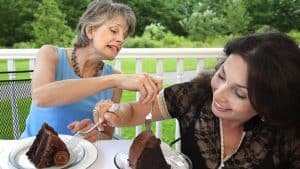
You can be happier and healthier as you grow older by embracing positive ageing.
Positive ageing is a practice which encourages maintaining a positive attitude, feeling good about yourself, keeping fit, active and healthy, and engaging fully in life as you grow older.
Maintaining a positive attitude about ageing enables you to take better control of your future and be happy with your current stage in life.
What is Positive Ageing?
Human brains have the amazing ability to rewire. They can be reprogrammed to grow stronger, rather than weaker, as we get older. This concept, which scientists call neuroplasticity, developed when research showed that many aspects of the brain remain changeable even into adulthood.
Can we really reprogram our brains to be happy about ageing? A growing body of research says that we can push back the decline of our cognitive abilities by building our social connections, engaging in physical exercise and making our brains work harder.
The Australian Psychological Society (APS) has studied positive ageing extensively. They found that the difficulties commonly faced by older Australians (and likely older people in general) include maintaining health and fitness, keeping up with social networks and activities, dealing with feelings of sadness and loss, worry over financial security, decreased mobility and an increasing reliance on others.
Their primary finding? That people who learn to deal with these issues in a positive way live longer and healthier lives, and enjoy a better quality of life as they grow older.
How to Live a Longer, Healthier Life
APS identified eight ways to age positively, including maintaining a positive attitude, staying connected, working to keep your brain active, managing stress, volunteering or seeking part-time employment, engaging in physical activity, having regular medical checkups and eating a healthy diet.
Many of these are issues which I discuss in Retiring Solo, a book which I wrote as I prepared to enter my 60s as a single woman. I was excited about the future and its possibilities, but knew that I needed a plan to ensure my independence in the years ahead. My efforts produced both a book and a plan for positive ageing.
The greatest challenge of growing older is maintaining good health. Our ability to be healthy, get healthy and stay healthy impacts our ability to remain socially, physically and mentally engaged with the world around us. There’s no question about that.
The way that you feel about yourself and ageing, in general, will affect your life view and your desire to engage in social and physical activities. The more control you have, the more likely you are to see ageing in a positive perspective. The more engaged you are, the more likely you are to remain in good mental and physical health.
Exercise Your Mind and Body
Keeping your mind active can be as simple as reading a book, learning a new hobby or doing a puzzle. Dealing with stress can be difficult for all of us. Stress can produce emotional, behavioral and physical symptoms, impair the immune system and diminish the quality of life.
Staying active – through social or physical activities, or by volunteering or working part-time – can help keep day-to-day stress in perspective.
Exercise is a great way to maintain health, fight depression and stress, and reduce the risk of disease. Strength training helps maintain healthy bones and joints, while also improving balance and mobility.
Physical activity can also provide social interaction, particularly if you join an activity program or gym, or link up with groups of other active adults. Eating well and maintaining healthy habits (e.g., exercising, not smoking, keeping alcohol in check) will help ward off illness, improve your energy level and make it easier to carry out your daily routine.
Growing Older is a Gift
There are some real rewards as we grow older. We generally grow more contented with life and our bonds with others become deeper and more satisfying. We look for more meaningful relationships and are less impulsive in creating new contacts.
We place a greater value on time and become better advisors to others. We place greater emphasis on quality, versus quantity, and look for ways to leave a lasting legacy behind.
Living a full and happy life requires planning and a positive, proactive approach that looks for ways to stay active, alert and engaged as we grow older. Positive ageing is a goal and a lifestyle that each of us should work to embrace.
How have you embraced getting older? Do you practice positive ageing? Are there health issues or other challenges that you have had to overcome to remain socially and physically engaged? Do you have a support circle of women who believe in positive ageing? How did you find it? Please share your thoughts and insights below!





